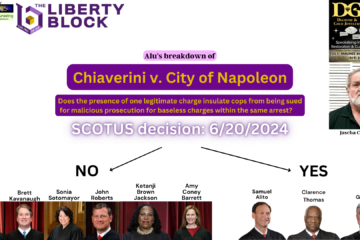The following article was written by Hannah Miyamoto, a retired attorney and current filmmaker with Pacifico Studios of San Luis Rey, CA (pacificostudios.net)”. This article was originally published to Your California Today and does not reflect the views of The Liberty Block. On the contrary, we re-published the article for the sole purpose of demonstrating to our readers that roughly half of the US population is so pro-abortion that the prohibition of abortion would be cause for them to seriously consider a national divorce, possibly by any means necessary. We mean no disrespect to Hannah, we simply believe that our ideology is not compatible with hers, and we wish progressives the best of luck in their quest for independence from anti-abortion Americans.
Although new abortion laws in other states are currently receiving the most media attention, the so-called “heartbeat” law that goes into effect in Georgia at the end of this year could be the greatest threat to the Union since the Civil War. That’s not a bad thing if people examine how the first Civil War began considering that a second Civil War could be fought over women’s rights. Before the courts decide whether the Georgia law imposes an “undue burden” on the women’s right to abortion, a look into the gaping abyss of civil war is due.
The Georgia “heartbeat” bill is dangerous because it extends the reach of Georgia’s laws against abortion, and even potentially criminalizes miscarriages and, including many in which women’s rights are paramount. As with the pre-Civil War laws that forced citizens in Northern states to re-capture escaped slaves, Georgia is on a collision course with every state that guarantees the right to abortion.
Everything is about to hit the fan because Georgia has not only made abortion illegal in Georgia, but it has made planning to leave Georgia, and also assisting a woman to get an abortion out of state equivalent to attempted murder or murder. Two problems with that are 1) Like escaped slaves, women can move on their own; 2) this bill seems to blur the lines between the jurisdiction of the states.

(Our commentary: 50% of twins are born before 36 weeks of gestation and more than 1 in 10 are born before 32 weeks. Millions of progressives – maybe even the majority Americans support aborting babies beyond 32, 36, and 40 weeks of pregnancy. If you don’t believe it would be okay to kill the above babies, you should separate yourself from the 45-55% of Americans who would fight to the death to defend their ‘abortion rights’.)
Imagine a woman, let’s call her “Polly Pro-Choice,” who lives in Georgia, where abortion is murder, but moves to Illinois, where abortion is recognized as a women’s right. She buys a home in Illinois, starts a new job there, forwards her mail from Georgia, and even registers to vote in Illinois. A week later, she is called for jury duty in Illinois. Then a week after that, Polly has an abortion in her new home state. Months later, Polly then returns to Georgia to visit her family for the holidays. The local prosecutor has her arrested for murder, and also charges everyone who helped her move to Illinois as murder accomplices.
Remember that Georgia has not only criminalized abortion, but also leaving or planning to leave Georgia to get an otherwise legal abortion in another state. Therefore, whether Polly committed murder depends on her state of mind—literally her intent upon her move from Georgia—when she decided to go to Illinois.
If Polly could prove that she only learned of her pregnancy after moving, she and all of her friends and family would be innocent. Also, if Polly plans to move to Illinois, discovers she is pregnant while she is still in Georgia, then Polly might be innocent. On the other hand, if Polly finds out she is pregnant, and then decides to move to Illinois, Polly, and all her friends and family might be convicted for murder. Remember, Georgia has criminalized planning to leave Georgia once you know you are pregnant with the intention of getting an abortion.
Moreover, the Georgia legislature could easily pass a law requiring every medical care provider to report pregnancies to a state database, and even require the name of everyone who buys a home pregnancy test kit to be reported to the State as well. A mandatory reporting law on pregnancy might not impose an “undue burden” on women or doctors according to the now-conservative Supreme Court, and the massive invasion of privacy from tracking pregnancies and pregnancy kit purchases is certainly less significant than the mandatory ultrasounds and other procedures that numerous states already subject women to.
So, depending on the evidence, Sweet Polly Pro-Choice, her friends, and the whole Pro-Choice family, could all be indicted for their role in a “murder” “planned” in Georgia, but “committed” in Illinois. All this because Georgia has decided to criminalize acts that are legal in other states.
If that isn’t bad enough, the prosecutor could also demand that Illinois extradite Polly, as well as the Illinois medical provider who performed the abortion and turn them over to Georgia to be prosecuted for murder and murder-related charges, and under the Full Faith and Credit Clause of the U.S. Constitution, Illinois would be forced to comply. Progressive Illinois, especially under pressure from local citizens and women’s rights advocates all over the world, would be reluctant to comply.
The potential for interstate conflicts over abortion would multiply exponentially if all the states with anti-abortion legislatures, of which there are dozens, pass laws like the Georgia “attempting to leave the state” law. In just a few years, the United States would be divided between states where abortion is a right, and states where merely planning to go to a legal-abortion state is a crime.
Furthermore, thanks to the U.S. Constitution, all the “Legal Abortion” states would be forced to assist the anti-abortion states and arrest and extradite all the women who crossed state lines to get a legal abortion. Anti-abortion states could even demand that physicians in legal abortion states be turned over to them for assisting women who left their state to get an otherwise-legal abortion.
Therefore, if the courts uphold the Georgia law, anti-abortion states could force pro-choice states to arrest and turn over both former citizens of anti-abortion states and citizens of who never entered an anti-abortion state, just for providing an otherwise legal abortion. That would go a long way to abolishing abortion rights in all 50 states.
We have been here before.
In December 1850, Southern legislators used their power in Washington to push the Fugitive Slave Act through Congress. The Fugitive Slave Law required every federal marshal to arrest any free black person and turn them over to a white person to be put into slavery. Moreover, the man or woman accused of being an escaped slave had no right to a trial, no right to testify in his or her own defense, and no right to call witnesses on his or her behalf. Effectively, the Fugitive Slave Law of 1850 made the law of the South–that a black man’s word must never contradict a white man–into the law of the United States.
Moreover–and here is where the state’s rights issues came in–any public official or ordinary citizen was required to aid in the arrest of any person named in a slaver’s affidavit. Furthermore, any person aiding an escaped slave was subject to six months in prison, and a fine of $1,000, or the equivalent of over $31,000 today.
The effect of the Fugitive Slave Law was to force every citizen in the United States, no matter where they lived, to have an opinion about slavery. Before 1850, slavery did not affect people in Free States directly; even if you lived on the edge of slave territory, like Cincinnati, Ohio, East St. Louis, Illinois, or Philadelphia, Pennsylvania, slavery happened “over there,” and you could live your entire life without thinking about it, if you wanted. Suddenly, just giving a terrified African-American a cup of water was a federal crime.
Violence was inevitable. In September 1851, residents in and around Christiana, Pennsylvania opened fire on federal agents, along with a slave owner and his men, while they attempted to arrest an escaped slave; the slave owner was killed in the gun battle. In response, federal authorities indicted 41 men, both Black and White, including several who had escaped to Canada, for – believe it or not – TREASON!
The first man tried, Castner Hanway, a white man, was defended by no one less than the Congressman representing the area, Thaddeus Stevens (the same caustic abolitionist portrayed by Tommy Lee Jones in the 2012 film Lincoln)! Persuaded by the vociferous Stevens, the jury duly found Hanway not guilty of treason against the United States of America. Soon after, all charges were dropped against the other men, black and white alike. Southerners fumed with rage.
Anti-slavery states also responded to the new federal law by passing state laws to defeat the federal law. Vermont, for example, created a legal process by which a person accused of being an escaped slave could defend themselves. Massachusetts and Wisconsin, setting a precedent similar to California’s “Sanctuary State” law, prohibited state and local officials from enforcing the federal slave-catching law.
Meanwhile, an unofficial war broke out between Missouri and Kansas. In late 1855, after violence erupted in Kansas, slavery supporters stole guns and a cannon from a Missouri arsenal and placed the anti-slavery town of Lawrence, Kansas under siege. Next spring, slavery supporters returned, destroying a hotel and two anti-slavery newspaper offices. In response, abolitionist John Brown and his comrades murdered five slavery supporters. Later that summer, a raiding party of hundreds of Missouri volunteers invaded Kansas, looting and burning towns and farms. Violence and looting in Kansas and retaliatory raids into Missouri continued until the Civil War, when Union troops forcibly de-populated several counties in Missouri to impose peace.
Therefore, Northerners and Southerners had many reasons to hold the other in contempt and hatred years before the Civil War began. The Civil War was both the ultimate expression of hatred, and a cause of it.
Like slavery supporters before the Civil War, abortion rights opponents have committed many arsons, bombings, and murders over the last three decades. Thus far, pro-choice activists have not killed anyone in retaliation. Their restraint is largely due to knowing that, although most Americans support abortion rights, they would denounce the use of violence to defend that right.
By effectively making the new Georgia anti-abortion law apply to women and men in all states, Georgia is forcing the entire nation closer to another Civil War. Federal courts must not hesitate to strike down the entire Georgia law, lest they trigger a rising wave of violence that consumes the American people like an unrelenting fire. Although, maybe after oppressing women for hundreds of years, that’s just what Americans deserve.


